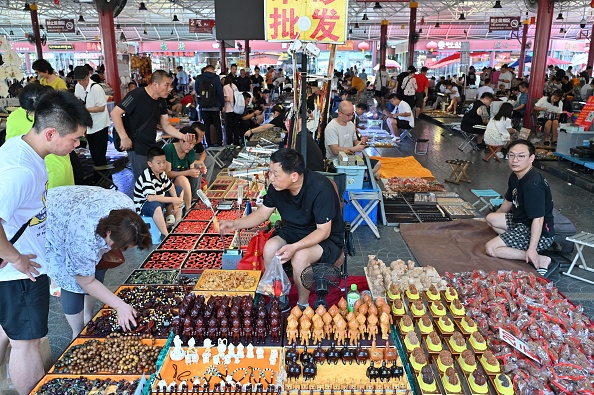The Chinese Communist Party has made a move by inviting fifty thousand American students to study in China, but foreign scholars interested in Chinese history say that the increasingly strict censorship system makes it both difficult and dangerous to find non-official historical documents in China.
In Beijing’s largest antique market, Panjiayuan, prominent signs can be seen warning against selling publications that may contain state secrets or “reactionary propaganda.” Some warnings provide hotlines for reporting.
Historians used to consider China’s antique and flea markets as treasure troves for obtaining documents, but these warning signs serve as constant reminders of the difficulties and even threats one may face when conducting historical research in China.
Xi Jinping, the leader of the Chinese Communist Party, invited fifty thousand American students to study in China within the next five years back in November last year. Whether this plan will make substantial progress remains an unresolved question.
Scholars studying modern Chinese history – perhaps one of the most interested groups in China – say that the increasingly stringent censorship system is stifling their ability to conduct independent research on China’s modern history.
According to a report by Reuters, the most restricted documents at present are those related to the Cultural Revolution of 1966-1976. This period was the most sensitive time in the history of the Chinese Communist Party when Mao Zedong declared class struggle, throwing China into chaos and violence.
Daniel Leese, a modern Chinese history scholar at the University of Freiburg in Germany, said, “I think the time when you could simply go to the flea market to search for treasures has basically come to an end,” adding, “Because it has become too complicated, difficult, and dangerous.”
Since the seizure of power in 1949, the CCP has exerted control over all publications, including books, media, and the internet. After Xi Jinping came to power in 2012, censorship became stricter, as he viewed “historical nihilism” or alternative historical narratives as the cause of the Soviet Union’s collapse.
Historians also point out that since 2010, the CCP has restricted access to the vast majority of local government archives, with digitization allowing censors to heavily redact documents.
Leese and other foreign historians have reported discovering files of persecuted intellectuals and secret Communist Party documents in China’s flea markets and antique markets.
These documents are often donated by relatives of deceased officials or found by booksellers near government offices that were dismantled during the large-scale layoffs of state-owned enterprises in the 1990s.
However, since 2008, the government has cracked down on the sources of flea markets and other second-hand books and documents. Buyers are arrested, sellers are fined, and politically sensitive items on second-hand book websites are removed.
In 2019, a Japanese historian was detained for two months for purchasing books about the Sino-Japanese War of the 1930s at a second-hand bookstore, facing espionage charges.
Two years later, a history enthusiast was fined 280,000 yuan for selling illegal publications from publishers in Hong Kong and Taiwan on China’s largest second-hand book website, “Kongfz.com,” without a business license.
This year, official media in China reported that two employees of recycling centers were punished for selling confidential military documents.
In recent years, a series of new national security and anti-espionage laws have made scholars more cautious when citing unofficial Chinese materials.
Some Western historians studying modern China say their research challenges official Chinese narratives or involves sensitive topics, leading to their visa applications to China being rejected.
James Millward, a historian at Georgetown University in the United States, said that after contributing to the 2004 publication “Eurasian Crossroads: A History of Xinjiang,” he was repeatedly denied Chinese visas but eventually obtained short-term visas after a lengthy process.
The political climate is also affecting the way historians choose their research topics. An American historian based in the U.S. said that he opts for non-controversial topics to maintain opportunities to travel to China.

